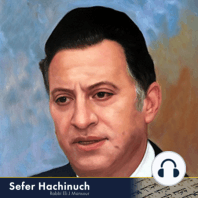20 min listen
Misva #233: Not to Pervert Judgment
FromSefer Hachinuch
ratings:
Length:
20 minutes
Released:
Jul 7, 2022
Format:
Podcast episode
Description
The Torah commands in Parashat Kedoshim (19:15), “Lo Ta’asu Avel Ba’mishpat” – which forbids judges from perverting judgment, issuing a ruling that runs in opposition to the legal precepts outlined by the Torah and the oral tradition. The Sefer Ha’hinuch writes that peace and stability in society require a just and effective legal system, and such a system, quite obviously, depends upon judges who rule fairly and honestly. The Torah therefore strictly forbids judges from perverting judgment by knowingly issuing incorrect rulings. This prohibition includes “Inui Ha’din” – unnecessarily delaying judgment. Certainly, judges must be patient and deliberate in reaching a decision, in order to ensure a correct ruling, as the Mishna in Pirkeh Abot (1:1) famously exhorts, “Hevu Metunim Ba’din” – “Be patient in judgment.” However, once a judge has reached his decision, he is not permitted to delay issuing his ruling. The Poskim apply this rule also to Rabbis who are asked Halachic questions. Once the Rabbi has done the research and analysis, and has arrived at a decision, he should present his ruling immediately, without delay. The Maharshal (Rav Shlomo Luria, Poland, 1510-1573) extended this notion further, maintaining that a Rabbi is required to answer every question brought to him, and may not refuse to hear a halachic question. In fact, the Maharshal instructed his family that if somebody came looking for him with a question, then no matter what he was doing – even if he was eating or sleeping – they should interrupt up to hear the question. According to the Maharshal, the prohibition of “Inui Ha’din” means that a Rabbi needs to stop whatever he is doing to hear a question, so that the individual asking the question will not have to wait to receive his answer. Most other Poskim, however, maintain that a Rabbi must not unnecessarily delay answering a question that he had agreed to address once he has determined the answer, but is not required to accept every question. Another law relevant to this prohibition requires less experienced judges to consult with older, more learned judges before issuing a ruling. Moreover, judges are required to approach each and every case with the same degree of interest and concentration, and treat each one seriously. The rule of “Din Peruta Ke’din Me’a” requires a judge to accord a case involving a single coin the same degree of importance as a case involving one hundred coins. No matter how much money is at stake, the judge is to preside over the case with the same level of seriousness. A judge is required to try to suggest a Peshara (compromise) between the two parties. The Sages inferred this requirement from the verse in the Book of Shmuel II (8:15) which describes King David as “Oseh Mishpat U’sdaka Le’chol Amo” – “doing justice and charity for his entire nation.” The word “Mishpat” (justice), of course, refers to adjudicating, and the word “Sedaka” implies that the justice was conducted in a “charitable” manner, meaning, through making compromises between the two parties. This prohibition applies in all times and in all places, but of course, it applies only to judges. A judge who intentionally issues an incorrect ruling transgresses this prohibition, but is not liable to Malkut, for two reasons. First, this prohibition is violated verbally, and not through committing an action, and Malkut are administered only for violations committed through an action. Secondly, this prohibition has the status of a “Lav Ha’nitan Le’tashlumin” – a violation which can be rectified through payment. If a judge issued an incorrect ruling, and the party that he wrongly found guilty paid the other party, then the judge must pay out of pocket to compensate the litigant. A violator is not liable to Malkut if the violation can be corrected by paying the victim, and thus a judge is not liable to Malkut for issuing an incorrect ruling.
Released:
Jul 7, 2022
Format:
Podcast episode
Titles in the series (100)
Misva #3: Gid Ha’nashe: Daily Sefer Hachinuch - Brought to you by itorah.com by Sefer Hachinuch
